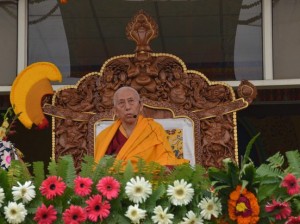Election Fever!
The current election is sparking huge interest, as well as debate and questions about the election procedures, as the Tibetan people in exile enjoy their democratic right to become involved in the process. They are empowered by social media and access to information, as well as improved education and increasing political awareness, and are entering into debates in Dharamshala and around the world.
Contact magazine went out to find out what people are saying about this election. We asked them whether they will vote and what are their expectations from this election. We also asked them what changes they would like to see. Their responses are overleaf. What do you think? Please write and tell us your views! You can email us at editor@contactmagazine.net
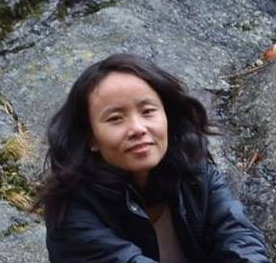 “For this year’s election, I expect more youth to participate in voting. The youth of the nation determines the future. So if they vote and choose their leader that is better. Once this election is done, I want to see more new faces in the parliament; educated, liberal and energetic leaders. The last election focused on the Sikyong, this time, the difference is that the current debates about the Middle Way and Rangzen have made people think. Lukar Jam attracted a lot of young people’s votes in the first round which has made people realise this issue is important and people are now more willing to speak about it. This is also relevant to the Chitue – new, young candidates are standing for Chitue and are standing for independence.” -Tenzin Dekyi
“For this year’s election, I expect more youth to participate in voting. The youth of the nation determines the future. So if they vote and choose their leader that is better. Once this election is done, I want to see more new faces in the parliament; educated, liberal and energetic leaders. The last election focused on the Sikyong, this time, the difference is that the current debates about the Middle Way and Rangzen have made people think. Lukar Jam attracted a lot of young people’s votes in the first round which has made people realise this issue is important and people are now more willing to speak about it. This is also relevant to the Chitue – new, young candidates are standing for Chitue and are standing for independence.” -Tenzin Dekyi
 “Yes I am going to vote. I think education is the most important thing. I think the current system is OK and has worked for 50 years and am not expecting change. I am not normally interested in politics but we are refugees so we have to get interested because of our struggle. The situation is not about us as individuals but about our country. His Holiness says that every Tibetan has to be an ambassador for his country. Being a refugee I think education is the most important thing. Being stateless, we can’t expect too much from our government. We have to be self-sustaining and do something for ourselves and not just expect the government to give us scholarships.” -Tsering Choemphel
“Yes I am going to vote. I think education is the most important thing. I think the current system is OK and has worked for 50 years and am not expecting change. I am not normally interested in politics but we are refugees so we have to get interested because of our struggle. The situation is not about us as individuals but about our country. His Holiness says that every Tibetan has to be an ambassador for his country. Being a refugee I think education is the most important thing. Being stateless, we can’t expect too much from our government. We have to be self-sustaining and do something for ourselves and not just expect the government to give us scholarships.” -Tsering Choemphel
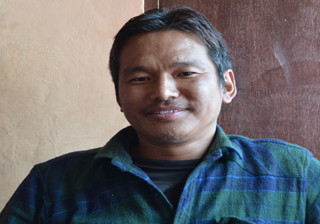 “Yes, as a Tibetan, I am going to vote. This time, there are many young candidates for Chithue and as for Sikyong, also there is variety. It is good to have more candidates with more views, so there is competition and we get to choose. I wish for someone who is able, someone who thinks for whole of Tibet can come up from this election. Whether it is Sikyong or Chithue, someone who can do something for the Tibetan cause should come up. We have been living here in exile for all these years. Come on! It’s time there is a change. Frankly speaking, His Holiness is getting old. It is time to change. On the Tibet-China, China-Tibet issue, I’d like to see the new Sikyong setting up talks with the Chinese government.” -Tenzin Jamyang
“Yes, as a Tibetan, I am going to vote. This time, there are many young candidates for Chithue and as for Sikyong, also there is variety. It is good to have more candidates with more views, so there is competition and we get to choose. I wish for someone who is able, someone who thinks for whole of Tibet can come up from this election. Whether it is Sikyong or Chithue, someone who can do something for the Tibetan cause should come up. We have been living here in exile for all these years. Come on! It’s time there is a change. Frankly speaking, His Holiness is getting old. It is time to change. On the Tibet-China, China-Tibet issue, I’d like to see the new Sikyong setting up talks with the Chinese government.” -Tenzin Jamyang
“I will not vote. I cannot. I am a Tibetan, born a Tibetan and both my parents are Tibetan but I have no legal Tibetan documents. I don’t have refugee papers, have no Green Book so am not eligible to vote. I can’t get a Green Book because my parents have Indian documents, to have a Green Book, at least one of your parents must have one. My grandparents are refugees. I feel really sad, I really want to vote. I feel like I am a part of Tibet, am Tibetan, but can’t participate, I can’t vote. For this election, I would like to see somebody getting elected who can give me a vote. Of course they must be honest and have good judgement and also recognise our need to vote and take part.” -Sangmo
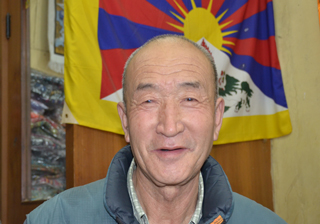 “Yes, I am going to vote. After this election, what I expect is to resume the pending work of Tibet-China dialogues. That is my first hope. Especially this year, there is so much awareness and interest in the general public about the candidates of Sikyong or Chithues. In earlier days, for Chithues election people didn’t show much interest or awareness at all. Unlike those days, this year it is different and everyone is involved in the process. To make changes, we can’t demand or ask for changes like free countries. Being in another’s country, we have to work according to others. I feel Chithue is more important. From the three pillars of democracy, Chithue are the law makers. So if the laws are not made properly, executors will face difficulty.” -Phuntsok
“Yes, I am going to vote. After this election, what I expect is to resume the pending work of Tibet-China dialogues. That is my first hope. Especially this year, there is so much awareness and interest in the general public about the candidates of Sikyong or Chithues. In earlier days, for Chithues election people didn’t show much interest or awareness at all. Unlike those days, this year it is different and everyone is involved in the process. To make changes, we can’t demand or ask for changes like free countries. Being in another’s country, we have to work according to others. I feel Chithue is more important. From the three pillars of democracy, Chithue are the law makers. So if the laws are not made properly, executors will face difficulty.” -Phuntsok
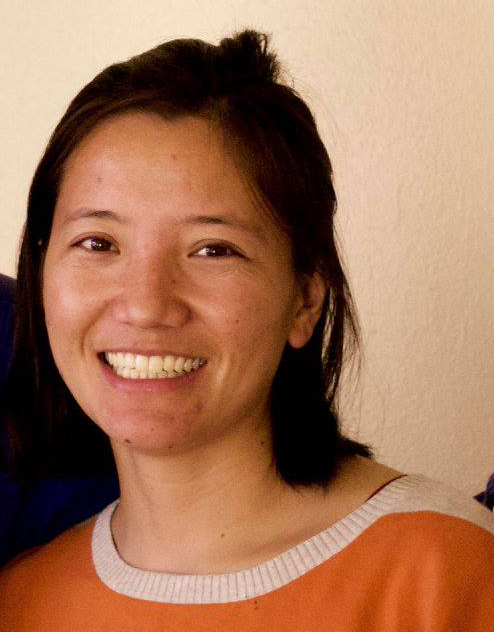 “Yes, I’ll definitely vote. The election this time, I feel that people are proactive in the elections and campaign, not just the candidates standing for election but also the public is taking more responsibility – in talking, discussing, campaigning and most importantly to vote in the final election. These are changes that we should welcome for a fuller realisation of democracy in our exiled community. However, there also exists a small portion of people who have misconceptions about elections and campaign, and make personal attacks against other candidates. That just paints the whole process with filth. For me, both Sikyong and Chithues are equally important. One cannot fulfil its job without the other. Therefore, we should give equal importance in voting for the right Sikyong and the right Chithues.” -Dukthen Kyi
“Yes, I’ll definitely vote. The election this time, I feel that people are proactive in the elections and campaign, not just the candidates standing for election but also the public is taking more responsibility – in talking, discussing, campaigning and most importantly to vote in the final election. These are changes that we should welcome for a fuller realisation of democracy in our exiled community. However, there also exists a small portion of people who have misconceptions about elections and campaign, and make personal attacks against other candidates. That just paints the whole process with filth. For me, both Sikyong and Chithues are equally important. One cannot fulfil its job without the other. Therefore, we should give equal importance in voting for the right Sikyong and the right Chithues.” -Dukthen Kyi
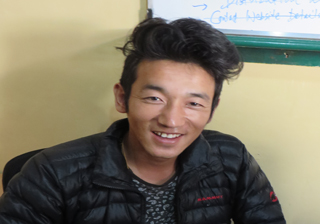 “This is my first vote. I think it’s very important for individuals to choose their right candidate. Actually, I am not very interested in politics, I just vote, I feel it’s my responsibility. I don’t want anything to change. Everybody is thinking about it. I’ve also attended talks of candidates. I like to go and listen to their public speeches, its very important to know what is happening. I find the politicians very inspiring and hard working. This election process is making me more aware and afterwards I will continue to keep an eye, looking forward, on what they are doing. In India, there are a lot of things that can make a difference to help the people living here, and education in the Tibetan language is important.” -Ngodup
“This is my first vote. I think it’s very important for individuals to choose their right candidate. Actually, I am not very interested in politics, I just vote, I feel it’s my responsibility. I don’t want anything to change. Everybody is thinking about it. I’ve also attended talks of candidates. I like to go and listen to their public speeches, its very important to know what is happening. I find the politicians very inspiring and hard working. This election process is making me more aware and afterwards I will continue to keep an eye, looking forward, on what they are doing. In India, there are a lot of things that can make a difference to help the people living here, and education in the Tibetan language is important.” -Ngodup
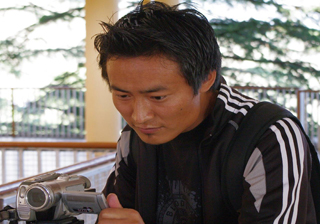 “Tibetan democracy is not a mobocracy but it is not flawless. It is just growing and every election is a learning process. I certainly believe the Election Commission has to go miles before it can claim to be a model system but the public also has to learn to respect others’ rights as well. If we all try to put His Holiness the Dalai Lama’s preaching and teachings into action, we would surely be able to have one of the best democratic systems in the world. The Election Commission needs to come up with a set of rules that would be permanent, not changing at the last minute, and the general public needs to be more open minded, more liberal and respect others’ points of view as well.” -Tendar Tsering
“Tibetan democracy is not a mobocracy but it is not flawless. It is just growing and every election is a learning process. I certainly believe the Election Commission has to go miles before it can claim to be a model system but the public also has to learn to respect others’ rights as well. If we all try to put His Holiness the Dalai Lama’s preaching and teachings into action, we would surely be able to have one of the best democratic systems in the world. The Election Commission needs to come up with a set of rules that would be permanent, not changing at the last minute, and the general public needs to be more open minded, more liberal and respect others’ points of view as well.” -Tendar Tsering
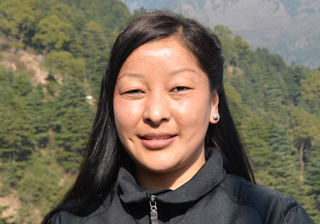 “My own political interest has increased this year, I’ve heard people’s thoughts and opinions on the election this year. All over the world Tibetan people are taking great interest and I think there will be more participation and I think this will mean we have better Chitues elected and the new Sikyong will do better. There will be a younger generation of Chitues elected to parliament this time which will make a difference. The Chitue takes the decisions of Parliament sessions, but Sikyong has greater responsibility. Chitue has smaller workload so its more important to elect the right person for Sikyong, more important than the Chitue. I want to see more political awareness among the Tibetan common people, currently people don’t have much idea how to vote; we need workshops, election workshops.” -Lhamo Tsering
“My own political interest has increased this year, I’ve heard people’s thoughts and opinions on the election this year. All over the world Tibetan people are taking great interest and I think there will be more participation and I think this will mean we have better Chitues elected and the new Sikyong will do better. There will be a younger generation of Chitues elected to parliament this time which will make a difference. The Chitue takes the decisions of Parliament sessions, but Sikyong has greater responsibility. Chitue has smaller workload so its more important to elect the right person for Sikyong, more important than the Chitue. I want to see more political awareness among the Tibetan common people, currently people don’t have much idea how to vote; we need workshops, election workshops.” -Lhamo Tsering
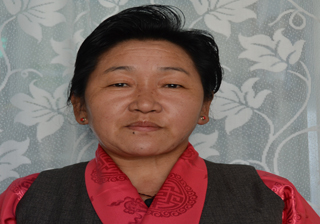 “His Holiness has given us democracy and the whole freedom is given to us. So I consider voting very important and will go to cast my vote. For Chithue candidates, there are many educated youths, who I think are all wanting to do their best for Tibet’s cause. This whole world is changing with an increase in educated people. The situation inside Tibet is bad and it is crucial to have a leader, be it Sikyong or Chithues, who can save Tibet, who can unite Tibetans all over the world for one cause. Sikyong is important but Chithues are more important. Chithues make law, so if they don’t unite and make good law, it will be difficult for the administration to execute and face problems. So I consider platform for Chithue very important.” -Tsering Dolma
“His Holiness has given us democracy and the whole freedom is given to us. So I consider voting very important and will go to cast my vote. For Chithue candidates, there are many educated youths, who I think are all wanting to do their best for Tibet’s cause. This whole world is changing with an increase in educated people. The situation inside Tibet is bad and it is crucial to have a leader, be it Sikyong or Chithues, who can save Tibet, who can unite Tibetans all over the world for one cause. Sikyong is important but Chithues are more important. Chithues make law, so if they don’t unite and make good law, it will be difficult for the administration to execute and face problems. So I consider platform for Chithue very important.” -Tsering Dolma
 “To vote is of course important as Tibetans need a Sikyong. So as long as opportunity is there, I will use my right to vote. I feel the last election was better. What needs to change? I feel all Tibetans need to be united without hatred and jealousy. This time, there is so much conflict and chaos, news spreading about corruption, I am not sure whether any of this is true or not. But whoever comes up after this election, be it Sikyong or Chithue, I hope they will work with honesty. The post of both Sikyong and Chithues are important. But I feel Sikyong is more important than Chithue. Chithues represent provinces or religious sects. Sikyong is the one who represents the whole of Tibet and shoulders the whole responsibility.” -Lodoe
“To vote is of course important as Tibetans need a Sikyong. So as long as opportunity is there, I will use my right to vote. I feel the last election was better. What needs to change? I feel all Tibetans need to be united without hatred and jealousy. This time, there is so much conflict and chaos, news spreading about corruption, I am not sure whether any of this is true or not. But whoever comes up after this election, be it Sikyong or Chithue, I hope they will work with honesty. The post of both Sikyong and Chithues are important. But I feel Sikyong is more important than Chithue. Chithues represent provinces or religious sects. Sikyong is the one who represents the whole of Tibet and shoulders the whole responsibility.” -Lodoe
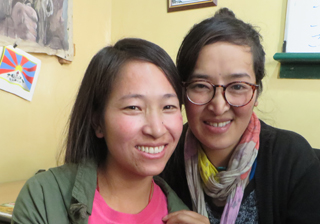 “We are voting for the first time. We are going to vote for Tibet. We are in exile and that’s something we can do for our cause. We have democracy for which we need a leader. To select that leader, we all use our right to vote. We are really excited about this election as first time voters. We all judge the candidates and now we are going to vote, we have responsibility. At the same time, it is exciting to exercise our rights via our vote. There are people who say there are no rights in democracy but when the time comes to use their right, they won’t turn up to vote. We hear most about the candidates from discussions about the election on social media such as Wechat and websites.” -Lhashi and Rinzin Sangmo
“We are voting for the first time. We are going to vote for Tibet. We are in exile and that’s something we can do for our cause. We have democracy for which we need a leader. To select that leader, we all use our right to vote. We are really excited about this election as first time voters. We all judge the candidates and now we are going to vote, we have responsibility. At the same time, it is exciting to exercise our rights via our vote. There are people who say there are no rights in democracy but when the time comes to use their right, they won’t turn up to vote. We hear most about the candidates from discussions about the election on social media such as Wechat and websites.” -Lhashi and Rinzin Sangmo




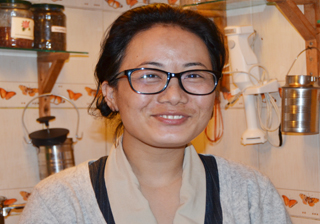
 Print
Print Email
Email